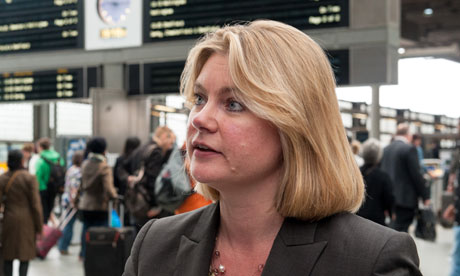
The first moves towards making motorists pay to use an existing road have been announced by the transport secretary as part of plans to upgrade one of Britain's most congested routes, the A14.
Justine Greening said that tolls could be introduced as part of an "innovative and imaginative solutions to tackling long-term congestion" along the road. The Department for Transport is proposing that a 20-mile stretch of widened and enhanced road would be subject to tolls to fund the scheme, along with local and national taxpayer contributions.
The prime minister signalled that road tolls were on the agenda back in March, he made an effort to spell out that they would only apply to new routes, not existing capacity. Labour warned that this "broken promise" could initiate more tolls on the existing network.
The DfT said work could begin by 2018 on the A14, the dual carriageway that crosses the east of England from the M1 and M6 to the ports of Felixstowe and Harwich and is often congested with heavy goods vehicles and local traffic. The proposals include a bypass around the Cambridgeshire town on Huntingdon. Two new roads would be built in parallel to the A14 north of Cambridge for local use.
Greening said the A14 was a crucial strategic route for the east of England, for international road traffic as well as daily users. She added: "This is why my department has been working hard to generate innovative and imaginative solutions to tackling long-term congestion and I am pleased to be able to unveil what we believe to be the best option for people living locally as well as those who see it as a lifeline to international markets."
Motoring organisations questioned the time scale involved and warned that drivers would see this as a broken pledge. AA president Edmund King said: "The prime minister said there would be no tolls on existing roads … This certainly contradicts the essence of the coalition agreement on tolling."
He said he feared it would simply divert traffic onto the proposed local free roads, instead of paying the charge. "Most of our members don't even support tolls on new roads, let alone existing ones, so I don't think this will be very popular with drivers." He also questioned whether the six-year delay before starting was due to the complicated funding arrangements. "Wouldn't it save more money to just do the work now and ease congestion? [A toll road] will take longer to build and fewer cars will use it."
Stephen Glaister of the RAC Foundation likewise urged the government to start work earlier: "This investment has been desperately needed for a long time. It was ready to go when the government pulled it in the spending review back in 2010.
"They've come to the conclusion that they can't make tolling work on the basis the prime minister originally announced [on new roads only]. If they can't make that funding package work here, where there is such a clear need both for the national, international and local interest, I can't see it will work anywhere."
John Woodcock MP, Labour's shadow transport minister, said: "Tolling existing roads is another broken promise to motorists who are being squeezed like never before by this out of touch government. Ministers need to spell out how many road users will be caught by the new tolls they are set to impose on existing roads."
The Campaign for Better Transport dismissed the announcement as "spin" to show the government was doing something on the economy. Sustainable transport campaigner Sian Berry said: "With a wide range of more sustainable measures still on the table for the A14 corridor, including serious bus improvements, the expansion of rail freight and smaller road proposals, we're confident that once these are evaluated in more detail the plans for a huge toll road will be deservedly dropped."
Transport charity Sustrans said the plans were a repeat of failed policies of the past. Policy director Jason Torrance said, "Building another new road can hardly be seen as an 'innovative and imaginative' solution to tackling congestion, it's continuing a move in the wrong direction - more concrete, more pollution and more traffic."

